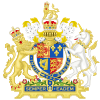
Edward Littleton, 1st Baron Lyttleton (also Littelton; 1589 – 27 August 1645), from Munslow in Shropshire, was a Chief Justice of North Wales. He was descended from the judge and legal scholar, Thomas de Littleton. His father, also Edward, had been Chief Justice of North Wales before him.
Education and career
He was educated at Oxford before becoming a lawyer. In 1614 he became an MP for Bishop's Castle, Shropshire in the Addled Parliament. In 1625 he was again returned to Parliament for Leominster and Caernarfon borough. In 1628 he was chairman of the Committee of Grievances upon whose report the Petition of Right was based.
As a member of the party opposed to the arbitrary measures of Charles I, Littleton had shown more moderation than some of his colleagues, and in 1634, three years after he had been chosen Recorder of London, the king attached him to his own side by appointing him Solicitor General. In the famous case about ship money, Sir Edward argued against John Hampden. In 1640, he was made Chief Justice of the Common Pleas.
The Great Seal

In 1641, when the previous keeper, John Finch, fled into exile, Littleton was appointed Lord Keeper of the Great Seal. He was raised to the Peerage as Baron Lyttelton of Munslow.
As the Lord Keeper Littleton had begun to display a certain amount of indifference to the royal cause. In January 1642, he refused to put the Great Seal to the proclamation for the arrest of five members and he also incurred the displeasure of Charles by voting for the Militia ordinance. However, he assured his friend Edward Hyde, afterwards Earl of Clarendon, that he had only taken this step to allay the suspicions of the parliamentary party who contemplated depriving him of the seal, and he undertook to send this to the King. He fulfilled his promise, and in May 1642, he himself joined Charles at York, but it was some time before he regained the favour of the king and the custody of the seal.
Death
Littleton died at Oxford on 27 August 1645; he left no sons and his barony became extinct. His only daughter, Anne, married her cousin, Sir Thomas Littleton, 2nd Baronet. Their son, Sir Thomas Littleton (c. 1647–1710), was Speaker of the House of Commons from 1698 to 1700, and Treasurer of the Navy from 1700 to 1710.
Notes
- ^ Brooks (2004), ODNB
- ^ Chisholm 1911.
References
- Christopher W. Brooks, 'Littleton, Edward, Baron Littleton (1589–1645)’, Oxford Dictionary of National Biography, Oxford University Press, Sept 2004; online edn, Jan 2008
 This article incorporates text from a publication now in the public domain: Chisholm, Hugh, ed. (1911). "Littleton, Edward, Baron". Encyclopædia Britannica. Vol. 17 (11th ed.). Cambridge University Press. p. 793.
This article incorporates text from a publication now in the public domain: Chisholm, Hugh, ed. (1911). "Littleton, Edward, Baron". Encyclopædia Britannica. Vol. 17 (11th ed.). Cambridge University Press. p. 793.
Further reading
- "Littleton, Edward (1589-1645)" . Dictionary of National Biography. Vol. 33. 1893. p. 36.
- John Campbell Campbell, Lives of the Lord Chancellors and Keepers of the Great Seal of England: From the Earliest Times Till the Reign of King George IV, John Murray, 1857 pp. 273–300
External links
![]() Media related to Edward Littleton, 1st Baron Lyttleton of Mounslow at Wikimedia Commons
Media related to Edward Littleton, 1st Baron Lyttleton of Mounslow at Wikimedia Commons
| Legal offices | ||
|---|---|---|
| Preceded bySir John Finch | Chief Justice of the Common Pleas 1640–1641 |
Succeeded bySir John Bankes |
| Political offices | ||
| Preceded byWilliam Juxon | First Lord of the Treasury 1641–1643 |
Succeeded byThe Lord Cottington |
| Preceded byJohn Finch | Lord Keeper 1641–1645 |
Succeeded bySir Richard Lane |
| Peerage of England | ||
| New creation | Baron Lyttelton 1641–1645 |
Extinct |
- Lord chancellors
- 1589 births
- 1645 deaths
- 17th-century English lawyers
- Barons in the Peerage of England
- Burials at Christ Church Cathedral, Oxford
- Chief justices of the Common Pleas
- English MPs 1614
- English MPs 1625
- Lord Keepers of the Great Seal
- Members of the Parliament of England for Caernarfon
- Recorders of London
- Welsh lawyers
